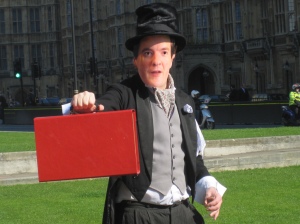By Chris Hansell
Are you a striver or a shirker? Do you get up early and put in a hard day’s graft? Or can you be found in your dressing gown watching repeats of Come Dine with me until the sun goes down?
George Osborne’s Autumn Budget Statement has already been picked apart and put back together again. A 1% cap on benefits spending rises until 2015 sits alongside a 1% cut in corporation tax.
Elsewhere the Treasury seems to be trying to cover its mistake from earlier this year of cutting the top rate of income tax to 40p. The threshold for the top rate will be capped to rise at 1% starting in 2014, meaning it will bring more people in to the 40p tax rate.
George Osborne already has a reputation as an old Etonian, but this Autumn Statement has made him almost Dickensian.
“Please, sir, I want some more”
When Iain Duncan Smith snapped at Owen Jones a few weeks ago on Question Time we got a glimpse of what today’s Conservative party really think the poor and out of work are. The Work and Pensions secretary talked of ‘about two and a half million people who were parked, nobody saw them, for over ten years, not working, no hope, no aspiration.’
As Mike Sivier points out at Vox Political Mr Smith’s statements were not entirely accurate. However the statements might tell us what the Tories see when they look at the poor and workless. They will be seeing more and more of them lately, as claimants for jobseekers allowance rose to almost 1.6 million in October.
Signs that unemployment might be easing should also be read with a chunk of scepticism. Speaking to the Telegraph, totaljobs.com’ s John Salt said ‘until we see growth in real job creation throughout the year, an underemployment bubble will continue to disguise the true picture of the UK’s labour market’. Mr Salt also highlighted the distortions created by temporary employment around Christmas and the Olympics.
Elsewhere an increasing number of claimants to housing benefit are in work, relying on welfare to pay for excessive rents.
Perhaps surprising is that the social housing sector, which accounts for well over half of the 5.05 million claiming housing benefit, just announced a record surplus of £1.4 billion for 2011/2012.
These profits come at a time when some commentators are claiming housing benefit simply subsidise excessive rents from landlords. With government cutting the social housing grant to landlords and housing benefit to be replaced by the untested universal credit the government is in danger of pricing people out of their homes. Excessive and rising rents are already a problem in parts of the country.
Plans for housing benefits will also affect as many as 380,000 young people who are either in work, looking for work or cannot work.
Like the outraged gentlemen of the Workhouse Board who were appalled by Oliver Twist’s request for a little more, the Chancellor cannot understand why the poor should need so much. The truth is that being poor is not something people chose, but it is a situation this government is making harder to be in.

